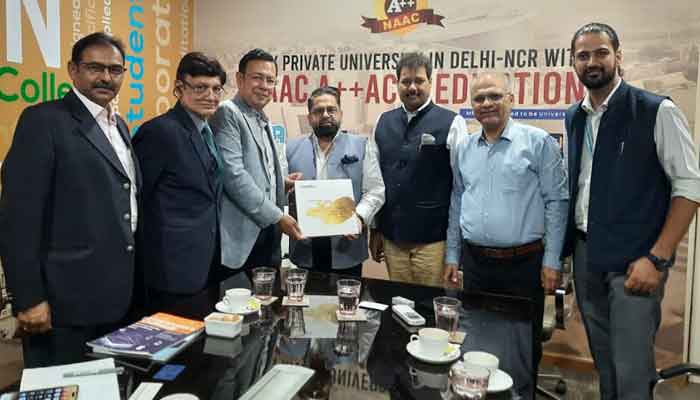Faridabad/Alive News : Manav Rachna International Institute of Research and Studies (MRIIRS) and Electronic Industries Association of India (ELCINA) on 21st July 2023 signed a Memorandum of Understanding (MOU) that will pave the way for a stronger partnership and collaboration between the two organizations in the electronics industry.
The MOU signing ceremony took place at the Manav Rachna Institute campus in Faridabad, with representatives from both organizations in attendance. Dr. Amit Bhalla, Vice President of Manav Rachna Institute, and Mr. Sanjay Agarwal, President of ELCINA, formalized the agreement by signing the MOU, solidifying their commitment to fostering cooperation, innovation, and growth within the electronics sector.
The MoU was signed in the presence of Dr. Ashwini Agarwal (Director, Applied Materials & Chair of ELCINA SIG for Semiconductors), Mr. Sundeep Saxena (Addl Secretary), Dr. Sanjay Srivastava (Vice Chancellor, MRIIRS), Dr. Naresh Grover (Pro Vice Chancellor, MRIIRS), Dr. Umesh Dutta (Director, Manav Rachna Incubation and Innovation Centre), Dr. Geeta Nijhawan (Associate Dean, School of Engineering & Technology).
Under the MoU, MRIIRS will hold regular meetings with ELCINA to work towards design of curriculum at undergraduate and postgraduate level based on their suggestions and demand. Along with this, the aim is to give students an opportunity to understand the modern technology of industries by better industrial partnership. Necessary changes will also be made in the direction of making the curriculum of Electronics and Communication Engineering skill-based.
Shri Sanjay Agarwal expressed delight at MRIIRS and ELCINA coming together as a partnership with great synergy.” Education and skills are the backbone of a knowledge based economy and India was emerging as a source of knowledge and technology. This MoU would facilitate industry-academia collaboration and accelerate the pace of innovation in the electronics industry and prepare a ready workforce for the sector. The global electronics industry is undergoing a period of rapid change, and India is well-positioned to take advantage of these opportunities. This partnership will help to ensure that India has the skills and expertise it needs to compete in the global market.”
During the program, Dr. Amit Bhalla expressed that expert programs will be organized with this MoU. Through these, high-level skill development of students in the field of Electronics and Communication Engineering will be possible and they will be able to understand technology, research and development and electronics in a better way. We are confident that this partnership will help to prepare our students for the challenges and opportunities of the 21st century.
Dr. Umesh Dutta said that semiconductor manufacturing is a rapidly emerging sector in India. Under the MoU, the association will help the institute in designing the curriculum as per the industrial demand at national and international level. The course outline will be prepared on the basis of the industry suggestions. Along with this, cooperation will also be given in providing practical training to students, organizing student internships and on-the-job training.
Dr Ashwini Agarwal said “The collaboration will harness the strengths and expertise of both organizations to provide focused skilling of the workforce which is aligned with needs of the growing semiconductor sector. By combining resources, knowledge, and networks, we aim to create a mutually beneficial partnership that will contribute to the success and progress of the electronics sector”.
Shri Rajoo Goel, Secretary General, ELCINA added “The electronics industry is a key driver of economic growth in India, and this partnership will help to further strengthen the sector. Manav Rachna Institute is a leading institution of higher education in India, and we will work with them to strengthen their technology skilling capacity which will be invaluable for the electronics and semiconductor industry. “
The MOU also highlights the importance of industry-academia collaboration. By working together, industry and academia can share knowledge and expertise, undertake joint research and development projects, and prepare students for the challenges and opportunities of the future. It will help to create a more vibrant and dynamic electronics industry in India, and it will benefit both organizations and the industry as a whole.



